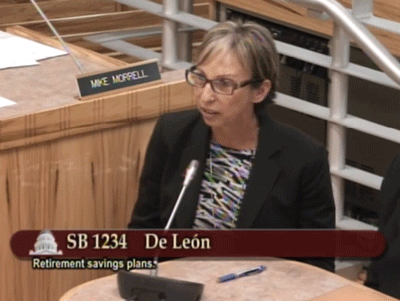 Legislation mandating a state-run retirement savings program for private sector employees continues to move in the Senate despite strong concerns expressed by the California Chamber of Commerce and a coalition of local chambers of commerce and other employer groups.
Legislation mandating a state-run retirement savings program for private sector employees continues to move in the Senate despite strong concerns expressed by the California Chamber of Commerce and a coalition of local chambers of commerce and other employer groups.
SB 1234 (de León; D-Los Angeles) potentially creates liabilities, costs and administrative burdens for employers by creating a mandated state-run retirement savings program for private sector employees without sufficiently addressing liability, costs and whether the program is subject to the federal Employee Retirement Income Security Act of 1974 (ERISA).
Retirement Crisis
The CalChamber and coalition recognize the importance of encouraging people to save for retirement in light of the retirement crisis facing California and the nation.
Large portions of the population face the prospect of outliving retirement assets due to low personal savings rates, lack of retirement planning, poor debt and credit management, and a general absence of financial literacy outreach regarding these critical life choices.

Employer Concerns
Significant challenges and concerns remain outstanding, however, with the Secure Choice program as proposed in SB 1234. The CalChamber and coalition have urged the author to include in the legislation solutions to these critical issues, and not leave them to be worked out by the Secure Choice Board. The most significant concerns are as follows:
• The issue of the applicability of ERISA remains unresolved. If ERISA applies to the program, employers could be subject to significant liability, and the entire program could be at risk.
• Rules and procedures as well as the employer responsibilities remain vague, which creates open-ended liabilities and administrative burdens which can lead to increased costs. The program is much more complex than it appears.
The legislation must specify that employers have no liability and are immune from liability associated with all aspects of the mandate and their participation in the program.
• Employers’ ministerial duties must be enumerated in order to create a bright line for employers to be safely outside the bounds of ERISA.
• Employer outreach and education are integral to the success of the program. This component is not adequately addressed in the legislation, as well as any costs associated and how it will be paid for.
• The enforcement mechanism requires clarity as well as costing out. The question of who will pay for enforcement is critical.
• The determination of whether the investments will be made as ROTH IRA or traditional IRA must be made. Guidelines must be in place for how enrollees will get information regarding which is the appropriate investment for them, and the implications of getting it wrong. It must be determined how this critical information will be provided to employees since employers may not provide guidance to employees without risk of ERISA pre-emption.
• The employer community has a higher level of comfort with an operational model that includes a third party as the interface between employer and employee, thus limiting the interaction between employer and employee—rather than a model whereby employers must handle all employee inquiries and transactions. Without this interface, employers will be subject to a higher level of administrative burdens and employee interactions that could expose the employer to ERISA and other liabilities.
• Regulations promulgated by the board deserve adequate time for deliberation and collaboration. The emergency rulemaking procedure may shorten the process so that meaningful participation by stakeholders would be limited. The rulemaking procedures should follow normal Administrative Procedures Act rules. If an emergency is present for a rulemaking, then it would meet the criteria for emergency rulemaking.
The CalChamber and coalition have urged the Legislature to move carefully, thoughtfully and deliberately so that neither employers nor employees are at risk, and that the program is beneficial to those who participate.
Key Vote
SB 1234 passed the Senate Public Employment and Retirement Committee on April 11, 3-2.
Ayes: Pan (D-Sacramento), Beall (D-San Jose), Hall (D-Los Angeles).
Noes: Morrell (R-Rancho Cucamonga), Moorlach (R-Costa Mesa).
Action Needed
SB 1234 is scheduled to be considered by the Senate Appropriations Committee on April 25.
Contact your senator and members of the committee to voice your concerns about the retirement savings program.
An easy-to-edit sample letter is available at calchambervotes.com.

